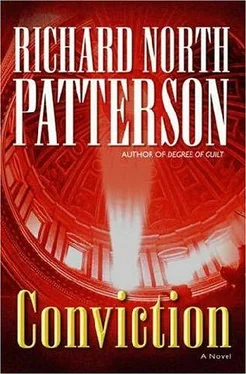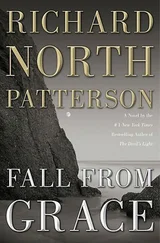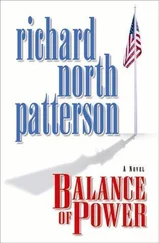Richard Patterson - Conviction
Здесь есть возможность читать онлайн «Richard Patterson - Conviction» весь текст электронной книги совершенно бесплатно (целиком полную версию без сокращений). В некоторых случаях можно слушать аудио, скачать через торрент в формате fb2 и присутствует краткое содержание. Жанр: Старинная литература, на английском языке. Описание произведения, (предисловие) а так же отзывы посетителей доступны на портале библиотеки ЛибКат.
- Название:Conviction
- Автор:
- Жанр:
- Год:неизвестен
- ISBN:нет данных
- Рейтинг книги:3 / 5. Голосов: 1
-
Избранное:Добавить в избранное
- Отзывы:
-
Ваша оценка:
- 60
- 1
- 2
- 3
- 4
- 5
Conviction: краткое содержание, описание и аннотация
Предлагаем к чтению аннотацию, описание, краткое содержание или предисловие (зависит от того, что написал сам автор книги «Conviction»). Если вы не нашли необходимую информацию о книге — напишите в комментариях, мы постараемся отыскать её.
Conviction — читать онлайн бесплатно полную книгу (весь текст) целиком
Ниже представлен текст книги, разбитый по страницам. Система сохранения места последней прочитанной страницы, позволяет с удобством читать онлайн бесплатно книгу «Conviction», без необходимости каждый раз заново искать на чём Вы остановились. Поставьте закладку, и сможете в любой момент перейти на страницу, на которой закончили чтение.
Интервал:
Закладка:
It was not an argument, merely a statement of truth, even—perhaps—an admission. And yet Monk and Mauriani had not cheated, as police or prosecutors sometimes did. They had simply used the system as it had always been used—and for the benefit, they must have believed, of Thuy Sen's family. Then Larry Pell, and the machinery of death, had taken Rennell from there to here.
Mauriani retreated to stand with Monk, near, yet apart from, the Sens.
Around them, the people of California slept, heedless of whom the State was executing in their name. In the morning, the radio or a newspaper might remind them of the worst act of Rennell's life—as told by Eddie Fleet—and they would feel that justice had been served. Some of them, comforted, might vote for Governor Darrow.
In the end, Terri knew, no one could prove Rennell's guilt or innocence. There was only one thing she was sure of—among those assembled here to watch him die, she alone understood his life.
* * *
When Chris and Carlo arrived at San Quentin Prison, a hundred or so candles flickered near the gate, lit by those who had to come to witness, or to pray. As they stepped from the car, a low fog, drawn across the bay by the inland heat of the day, left a damp chill on Chris's face.
He glanced over at his son and saw, for an instant, the scared seven-year-old boy who had first come to live with him. But the image—surely a father's imagining—was replaced by a young lawyer tempered by adversity and gripped by sorrow and anger. A different man; still the son he cherished, but changed.
Silent, they began walking toward the prison.
* * *
To her intense relief, Terri saw her husband and stepson enter the viewing area. It was 11:50, and soon Rennell Price would appear in the death chamber, the IVs protruding from his arm. Terri did not wish to be alone.
Quiet, Chris stood at one side of Terri, Carlo the other, each taking one of her hands. "How are Elena and Kit?" Terri murmured to her husband.
"Fine. Kit's asleep. Elena says she's waiting up for you."
The door of the death chamber slowly opened.
Rennell stumbled, eyes wide and fearful, guided by the medical technician who would connect his arms to the syringes. Then he looked up, gazing dully at the faces watching him through the glass. Hoping that he would find her, Terri managed a smile.
At last Rennell saw her. He seemed to pause, as though to imprint her face in some eternal memory. But when he tried to smile back, his eyes moistened. Shamed, he tried to wipe them with the swath of denim sleeve rolled back for the syringe.
"Oh, God, Rennell . . ."
It was her own voice, Terri realized. As he gazed up at her again, Rennell's mouth formed words but made no sound.
Carlo's grip tightened on her hand.
With palpable reluctance, Rennell faced the Sens. In a voice thick with fear and sadness, he said, "I didn't do your little girl . . ."
Once more, Kim held up the picture of Thuy Sen, covering her own face. Standing behind them, a reporter scribbled in his notepad.
Turning Rennell, the technicians laid him on the gurney.
Wordless now, Terri watched them strap Rennell to the table—spread-eagled, unable to protect himself, about to die. She had the visceral urge to scream, to pound the glass window and say that this must stop. And still she watched.
The reporter kept jotting notes.
As Rennell gazed at the ceiling, tears slid from the corners of his eyes. Briefly, Terri looked away and felt Chris touch her shoulder. "You gave him hope, for a time. And caring always."
Terri looked up at him. His face was set, the lines at the corners of his eyes taut and more deeply graven. "You may carry out the death warrant," she heard the warden intone.
"Never again," Carlo said between his teeth. "Never again."
Terri saw Chris glance over at him, as though to discern his meaning. Then, once more, she faced the chamber.
Through the glass, Rennell's eyes fluttered. As she had not done since childhood, Terri bowed her head and began to murmur, "Holy Mary, Mother of God, pray for us now and at the hour of our death . . ."
* * *
Slowly, Rennell felt sleep seeping through his body, more deep and numbing than any sleep he had known before. He was waiting for his brother, like he had done for his whole life. He hoped that Payton would come soon.
AFTERWORD AND ACKNOWLEDGMENTS
THE DEATH PENALTY IS A DIFFICULT AND EMOTIONAL SUBJECT. In writing this book, I (like Christopher Paget) found myself looking at my nine-year-old son from several conflicting perspectives: How would I feel about a murderer who subjected him to a terrible death? How would I feel if, on the eve of execution, postconviction lawyers cast doubt upon the guilt of a man whose guilt I had never doubted? And what kind of man would my own son become if he had the terrible history common to so many occupants of death row?
These questions, and others, pervade our system of capital punishment. But this emotional complexity is only the beginning: the law of capital punishment is far more complicated than I portrayed it (a Supreme Court justice once remarked to me that the only legal thicket of similar obscurity is patent law). So it is important to emphasize that the body of law I depicted is authentic. The Antiterrorism and Effective Death Penalty Act (AEDPA) is a real statute, and the cases and legal principles I cite are also real, however hypertechnical or counterintuitive they may seem; indeed, I was forced to simplify both the law and legal procedure—drastically—in order to make them comprehensible to laypeople. Even the case described by Judge Blair Montgomery to Chief Justice Caroline Masters, in which the execution turned on an administrative error within the Ninth Circuit Court of Appeals, is real—though I severely condensed its Byzantine history, which otherwise would have consumed many more pages than most readers could have tolerated.
Thus the essence of my problem was to portray the murky reality of the law with sufficient clarity to convey its pitfalls and yet be understood. Not easy. As an ex-lawyer, I find this the most difficult area of law I have ever encountered, convoluted in both substance and procedure. But the bottom line is this: much of this complexity reflects a fundamental and passionate disagreement—whether the principal goal of postconviction litigation is achieving finality or preventing the potential execution of the innocent. I hope that this novel does that conflict justice.
Given all this, I'm particularly grateful to those who gave me the benefit of their experience and expertise.
To be a postconviction litigator requires astonishing resourcefulness, resilience, and stamina—physical and psychological. I was fortunate to have the advice of some of the country's foremost specialists, for whom this is a full-time career: Anthony Amsterdam, Sandra Babcock, Stephen Bright, David Bruck, Tim Ford, Larry Marshall, Gary Sowards, Bryan Stevenson, Keir Weyble, and especially Michael Laurence, who not only met with me for countless hours but reviewed the manuscript to help me stay true to the environment of habeas corpus litigation. Thanks, too, to the other fine lawyers who shared with me their experience in postconviction litigation: Eve Brensike, Vernon Jordan, David Kendall, Leslie Landau, Jay Paultz, Linda Schilling, Dorothy Streutker, and Doug Young.
A particularly fascinating area involved re-creating an inmate's social history and psychological profile. I was lucky to have the advice of Scharlette Holdman, the pioneer of social histories, as well as that of psychologist Kathy Wayland. Mental health professionals who shared their perspectives on death row inmates included Dr. Karen Froming, Dr. Ruth Luckasson, Dr. Daniel Martel, Dr. Richard Yarvis, Dr. Myla Young, and especially Dr. George Woods.
Читать дальшеИнтервал:
Закладка:
Похожие книги на «Conviction»
Представляем Вашему вниманию похожие книги на «Conviction» списком для выбора. Мы отобрали схожую по названию и смыслу литературу в надежде предоставить читателям больше вариантов отыскать новые, интересные, ещё непрочитанные произведения.
Обсуждение, отзывы о книге «Conviction» и просто собственные мнения читателей. Оставьте ваши комментарии, напишите, что Вы думаете о произведении, его смысле или главных героях. Укажите что конкретно понравилось, а что нет, и почему Вы так считаете.












